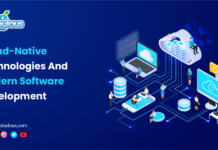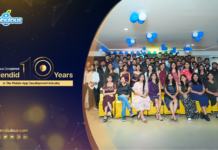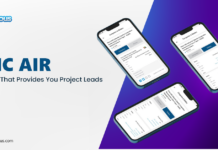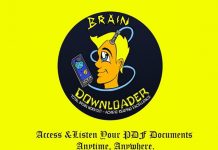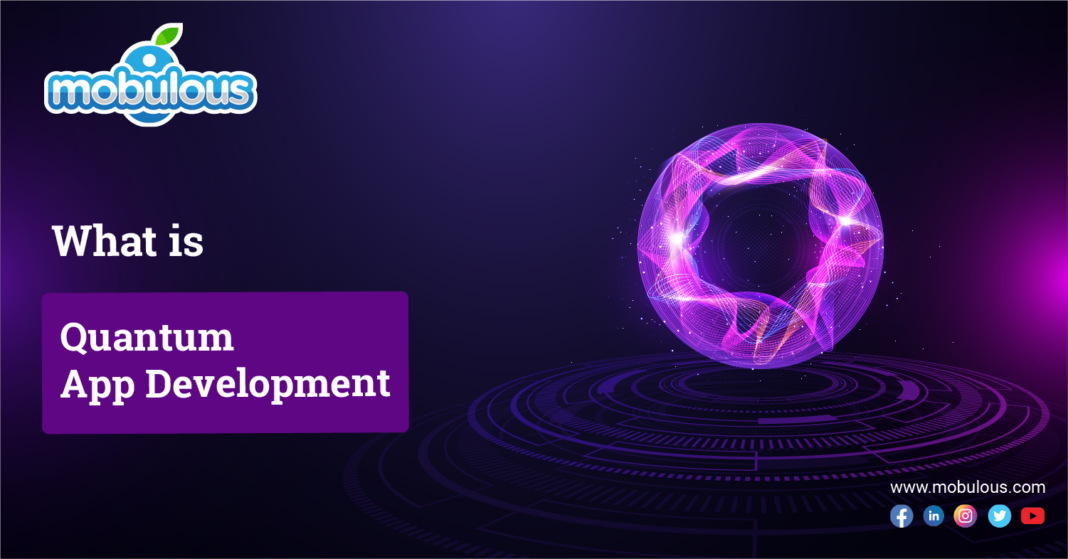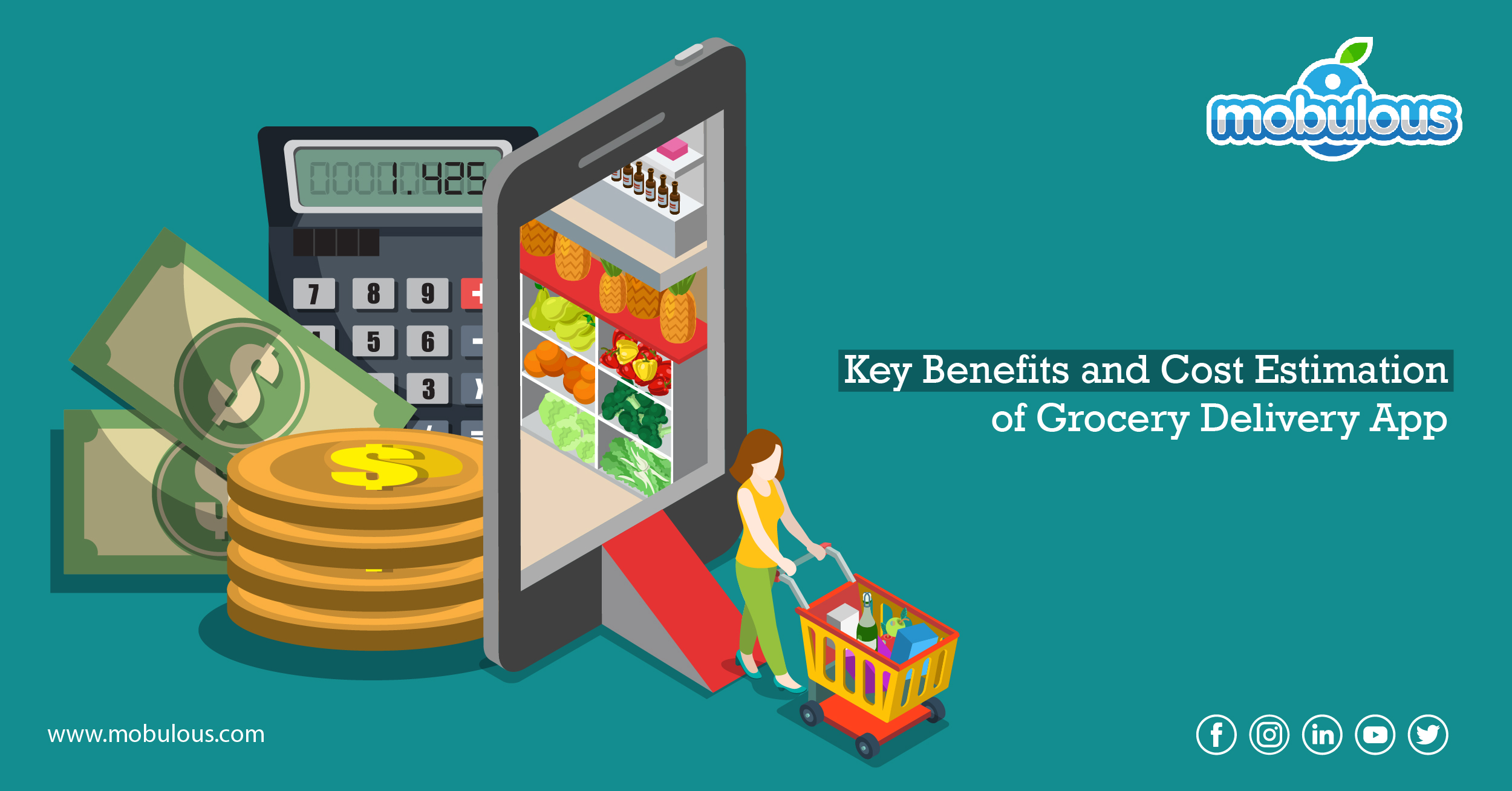What is Quantum App Development?
Quantum App Development involves creating and deploying applications that harness the power of quantum computing. Unlike classical computers using bits, quantum computers utilize quantum bits or qubits, which can exist in multiple states simultaneously due to quantum principles like superposition and entanglement.
In Quantum App Development, developers leverage qubits, enabling faster computation, particularly in complex problem-solving and cryptographic tasks. Special quantum computers and programming languages like Qiskit or Cirq are employed to build these innovative apps, with potential applications across various industries.
Quantum App Development v/s Classical Computer
| Sr. No. | Feature | Quantum Computing | Classical Computing |
| 1 | Bit vs. Qubit | Utilizes quantum bits or qubits (superposition) | Uses classical bits (0 or 1) |
| 2 | Data Representation | Complex data representation with quantum states | Binary data representation with classical bits |
| 3 | Parallelism | Exploits superposition for parallelism | Processes data sequentially |
| 4 | Quantum Gates vs. Classical Gates | Utilizes quantum gates (Hadamard, CNOT, etc.) | Operates with classical logic gates (AND, OR, NOT) |
| 5 | Quantum Entanglement | Qubits can be entangled, providing unique computational advantages | No entanglement between bits |
| 6 | Measurement and Uncertainty | Measurements introduce uncertainty due to the probabilistic nature | Measurements are precise and deterministic |
| 7 | Error Correction | Requires specialized quantum error correction algorithms | Employs error correction through redundancy and repetition |
| 8 | Algorithm Design | Leverages quantum parallelism, superposition, and entanglement | Deterministic and efficient classical logic |
| 9 | Scalability | Exponential computational power potential with increasing qubits | Adding more classical bits with limitations |
| 10 | Programming Languages | Quantum programming languages (Qiskit, Cirq, Quipper) for quantum algorithms | Traditional programming languages (Java, Python, C++, etc.) |
Quantum App Development Benefits
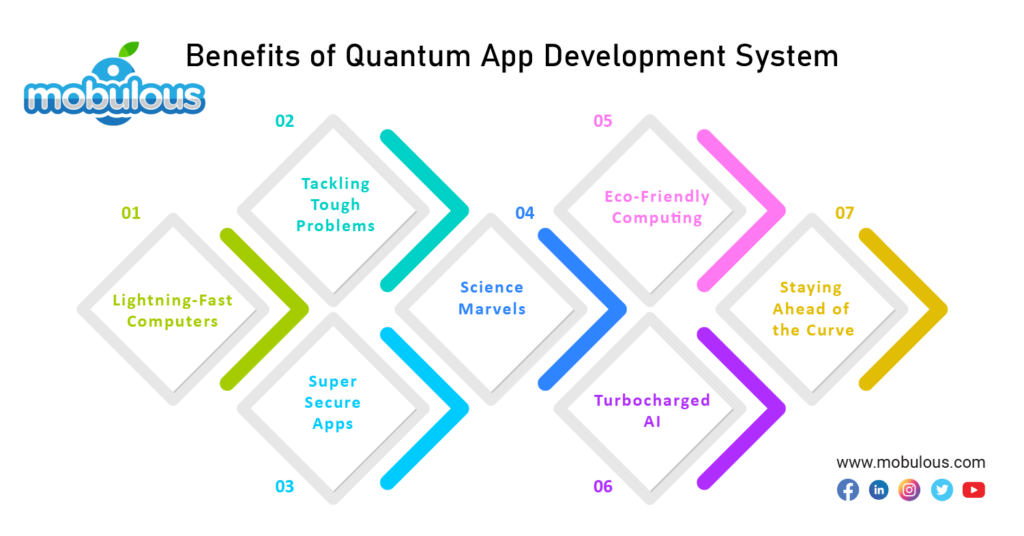
- Qubits enable lightning-fast app performance by performing multiple calculations simultaneously.
- Quantum apps adeptly tackle complex issues like weather prediction and code-breaking.
- Quantum encryption ensures super-secure apps, highly resilient to hacking attempts.
- Quantum apps contribute to scientific marvels, advancing drug discovery and materials science.
- Quantum computers are eco-friendly, reducing energy consumption and operational costs.
- Turbocharged AI capabilities in quantum computing enable advanced app features.
- Quantum app development keeps you ahead, positioning for the future of computing.
Quantum App Development and Quantum Computing
Quantum computing is an innovative paradigm of computation that utilizes the principles of quantum mechanics to process information. Unlike classical computers, which use bits as the fundamental units of information, quantum computers employ quantum bits, or qubits. Qubits can exist in multiple states simultaneously, thanks to the phenomena of superposition and entanglement.
How Quantum Computers Differ from Classical Computers?
Quantum computers differ fundamentally from classical computers in their use of qubits. While classical computers use bits that can exist in either a 0 or 1 state, qubits can exist in a superposition of both 0 and 1 simultaneously. This unique property allows quantum computers to process vast amounts of information in parallel, providing a potential for exponential computational speedup.
Explanation of Quantum Superposition & Entanglement
Quantum superposition is a fundamental principle where a qubit can exist in multiple states at once. In the case of quantum computing, this enables a simultaneous exploration of various solutions to a problem. Entanglement is another key quantum phenomenon, describing the interconnectedness of qubits. When qubits become entangled, the state of one qubit is intrinsically linked to the state of another, even when measured independently. This interdependence facilitates the correlation of information and contributes to the unique capabilities of quantum computers.
Milestones and Key Developments in the History of Quantum Computing
Quantum computing is widely regarded as the next frontier in computational technology, representing the dawn of a new era in computing history.
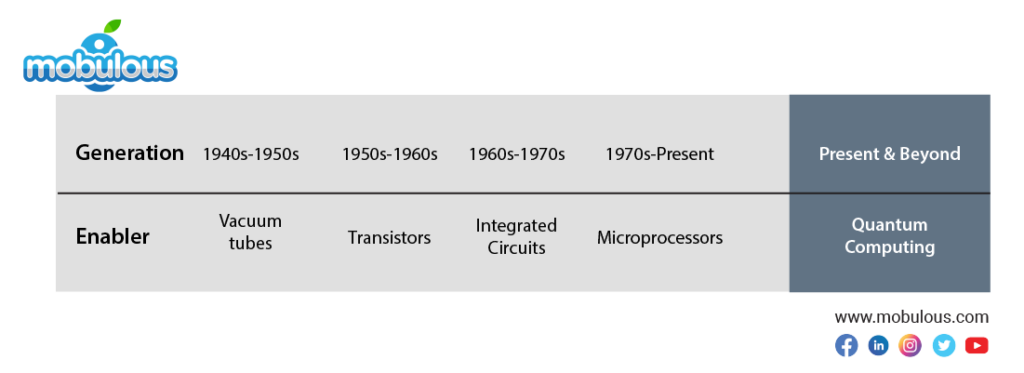
As we navigate through the various epochs of computing, the evolution of quantum computing stands out as a remarkable journey, marked by ground breaking milestones and transformative developments. These pivotal events have not only shaped the quantum landscape but also hold the promise of revolutionizing how we process information. Let’s delve into the historical tapestry of quantum computing, uncovering key moments that have paved the way for this quantum revolution.
1980s: Pioneering Concepts
- Richard Feynman proposes the concept of quantum computing in the 1980s, suggesting its potential advantages in simulating physical systems more efficiently than classical computers.
- David Deutsch introduces the idea of a “universal quantum computer” in 1985, laying the theoretical foundation for quantum computation.
1990s: Quantum Algorithms Take Shape
- In 1994, Peter Shor unveils an algorithm that efficiently factors large numbers, presenting a breakthrough with implications for modern encryption (Shor’s algorithm).
- Lov Grover introduces a more efficient algorithm for searching databases, known as Grover’s search algorithm, in 1996.
- Seth Lloyd proposes a quantum algorithm capable of simulating quantum-mechanical systems in 1996.
Emergence of Quantum Companies
- In 1999, D-Wave Systems is founded by Geordie Rose, marking the inception of a company dedicated to building quantum computers.
Early 2000s: Experimental Implementation
- In 2001, IBM and Stanford University publish the first implementation of Shor’s algorithm, factoring 15 into its prime factors on a 7-qubit processor.
- Eddie Farhi at MIT develops the concept of adiabatic quantum computing in 2000.
Commercialization and Accessibility
- D-Wave One, the first commercial quantum computer (annealer), is released in 2010.
- IBM makes quantum computing available on IBM Cloud in 2016, marking a significant step towards democratizing access to quantum resources.
Quantum Supremacy
- In 2019, Google claims the achievement of quantum supremacy, demonstrating its quantum computer’s ability to perform a specific task faster than any classical computer.
Current Industry Landscape
- Companies like IBM, Microsoft, Google, and D-Wave Systems play pivotal roles in advancing quantum computing, investing heavily in research and development.
- Quantum-focused companies like 1QBit contribute to the field by developing software and solutions for practical applications in various sectors.
Career Opportunities in Quantum Computing
Quantum computing, often dubbed the next frontier of technology, opens doors to a myriad of captivating career paths. Let’s embark on a journey through five quantum careers and explore how professionals entered this cutting-edge realm.
- Quantum Research Pioneer:
- Entry Point: Ideal for students or tech researchers.
- Transition Journey: Pivot focus to quantum, delve into quantum events, and build networks.
- Skill Requirements: Expertise in quantum hardware, algorithms, or material science.
- Quantum Code Artisan:
- Entry Point: Suited for existing software developers.
- Transition Journey: Leverage Python, C++, Java for quantum algorithms, contribute to quantum suites.
- Skill Requirements: Proficient in classical programming, with a grasp of quantum concepts.
- Quantum Engineering Maestro:
- Entry Point: Open to engineers with or without quantum experience.
- Transition Journey: Explore roles like DevOps engineer without quantum knowledge; gain quantum understanding for specific roles.
- Skill Requirements: Engineering expertise, quantum mechanics and physics knowledge for some roles.
- Quantum Marketing Maven:
- Entry Point: Ideal for those interested in the practical aspect without deep technical involvement. Transition Journey: Learn basics of quantum for accurate advocacy; organize events to spread quantum knowledge.
- Skill Requirements: Basic understanding of quantum, effective communication, and organizational skills.
- Quantum Education Evangelist:
- Entry Point: Critical for those passionate about educating others on quantum concepts.
- Transition Journey: Develop curricula, teach quantum basics, and make knowledge accessible.
- Skill Requirements: Strong passion for education; ability to simplify and communicate complex concepts.
Quantum App Developers: Roles, Skills, and Salaries
Role Overview
A quantum app developer holds a pivotal role, charged with the design, development, and testing of Python/C-based solutions within quantum software stacks. Their responsibilities align with traditional software development practices, including the creation of software solutions based on validated customer requirements.
Key Responsibilities
Explore the diverse responsibilities of a quantum developer, ranging from working on drafts and maintaining technical documentation to benchmarking quantum computing algorithms and optimizing software. Their analytical prowess comes to the forefront as they analyze issues and effectively communicate solutions to stakeholders.
Quantum Development Expertise
Quantum developers bear the responsibility of crafting software solutions adaptable to both COTS (Commercial Off-The-Shelf) and GOTS (Government Off-The-Shelf) systems. Additionally, they play a crucial role in supporting the development of user interfaces and web services solutions.
Skills Set of a Quantum Developer
- Technical Proficiency: Quantum developers showcase extensive knowledge of Quantum theory and its principles. Proficient in programming languages, particularly Python and C, they excel in crafting readable, high-integrity, and efficient code. Their skills extend to algorithm development, performance analysis, and a sound understanding of numerical computation.
- Analytical Thinking and Decision-Making: Fuelled by strong analytical thinking and attention to detail, quantum developers approach decision-making and design choices with a pragmatic mind-set. Their organizational skills shine as they guide a small team of engineers through the intricate quantum landscape.
Background and Education
- Academic Qualifications: To embark on a career as a quantum developer, a minimum of a Bachelor’s degree is usually required. Degrees in Computer Science, Software Engineering, Computer Programming, Electrical Engineering, or related fields pave the way for entry into this challenging yet rewarding field.
- Certifications and Continuous Learning: In certain cases, additional experience may be considered in lieu of a degree, especially when accompanied by a proven track record. Quantum developers often pursue certifications to enhance their knowledge. Options include courses like “The Complete Quantum Computing Course,” “Applied Quantum Computing I: Fundamentals,” “Quantum Computer Systems Design I: Intro to Quantum Computation and Programming,” and “CS50’s Introduction to Programming with Python.”
Quantum Developer Salary Insights
Quantum developers command a competitive salary, with the potential to earn anywhere between $107,000 and $156,000 in the United States. The average salary hovers around $140,000 per year. Geographic variations are evident, with quantum developers in Germany earning between €69,000 and €123,000, and those in the UK making £30,000 to £81,000 annually
Quantum App Development Software/Toolkit
There are several tools and software frameworks available for quantum app development, enabling developers to explore and experiment with quantum programming. Here’s an overview of some popular tools and frameworks:
- Qiskit (IBM):
- Description: Developed by IBM, Qiskit is an open-source quantum computing software development framework. It provides tools for writing quantum algorithms using Python and allows users to run experiments on IBM’s quantum processors or simulators.
- Getting Started: IBM provides extensive documentation, tutorials, and educational resources on their website to help developers get started with Qiskit.
- Cirq (Google):
- Description: Cirq is an open-source quantum computing framework developed by Google. It allows developers to build, edit, and simulate quantum circuits using Python. Cirq is designed to be highly flexible and supports both noisy intermediate-scale quantum (NISQ) devices and larger-scale quantum computers.
- Getting Started: Google provides documentation and examples on their Cirq GitHub repository to help developers get started.
- Forest (Rigetti):
- Description: Rigetti Computing offers the Forest software development kit (SDK), which includes tools for programming quantum processors. It provides access to Rigetti’s quantum hardware as well as a quantum simulator.
- Getting Started: Rigetti offers documentation and tutorials on their website to help developers start working with Forest.
- Quipper (Microsoft):
- Description: Quipper is a quantum programming language developed by Microsoft Research. It allows developers to write quantum algorithms using a functional programming paradigm. Microsoft also provides the Quantum Development Kit, which includes tools and resources for quantum programming using Q#.
- Getting Started: Microsoft’s Quantum Development Kit documentation and tutorials provide guidance for getting started with Quipper and Q#.
- PennyLane (Xanadu):
- Description: PennyLane is an open-source quantum machine learning library developed by Xanadu Quantum Technologies. It integrates with popular machine learning frameworks like TensorFlow and PyTorch, enabling developers to combine quantum computing with machine learning tasks.
- Getting Started: Xanadu provides documentation and tutorials on their PennyLane GitHub repository to help developers start using the library.
- Ocean (D-Wave):
- Description: D-Wave’s Ocean software development kit provides tools for programming quantum annealing processors. It includes libraries for working with quantum optimization problems and hybrid quantum-classical algorithms.
- Getting Started: D-Wave offers documentation and examples on their Ocean GitHub repository to assist developers in getting started.
Companies Using Quantum App and Computing For Advanced Purposes
1. IBM (International Business Machines Corporation) is a big name in the world of technology, and they’re leading the charge in quantum computing. They’ve created a quantum computer called IBM Q System One that can tackle problems in fields like chemistry, finance, and logistics. For example, it can help discover new materials for better batteries or optimize supply chain routes for companies.
2. Google developed a quantum computer called Sycamore that aims to solve problems that are extremely hard for regular computers. They’re working on things like simulating molecules to create new medicines and making our internet security stronger.
3. D-Wave Systems focuses on something called quantum annealing. This technology is great for solving optimization problems. Companies like Volkswagen are using D-Wave’s quantum computers to improve traffic management and reduce emissions by finding the most efficient routes for their vehicles.
4. Rigetti is working on making quantum computing more accessible to everyone. They offer cloud-based access to their quantum computers, allowing researchers and companies to experiment and develop applications without needing their own quantum hardware. This can be helpful in fields like drug discovery and cryptography.
5. Honeywell has developed its own quantum computer. They are using it to create more efficient materials for electronics and discover new ways to improve industrial processes. This can lead to better and faster electronic devices and more sustainable manufacturing.
6. Microsoft is building quantum computing tools and software to help businesses and researchers. They want to make it easier for people to use quantum computers to solve complex problems, from creating better medicines to optimizing traffic flow in cities.
7. IonQ is working on a type of quantum computer called trapped-ion quantum computers. They’re partnering with companies like Goldman Sachs to explore how quantum computing can enhance financial modelling and solve intricate financial problems.
Popular Real-Life Examples of Quantum App
1. Cryptography and Cyber security:
- Problem: Regular computers can crack codes, making online transactions and data vulnerable.
- Quantum Solution: Quantum computers can create unbreakable codes using a property called quantum encryption. They use quantum bits (qubits) to make communication super secure.
2. Drug Discovery:
- Problem: Finding new medicines takes a long time and is costly.
- Quantum Solution: Quantum computers can simulate complex molecular interactions quickly. This helps scientists discover new drugs faster and design customized treatments.
3. Optimization Problems:
- Problem: Companies need to solve big puzzles like optimizing routes for delivery trucks or scheduling tasks efficiently.
- Quantum Solution: Quantum computers excel at solving these puzzles, saving time and resources.
4. Financial Modelling:
- Problem: Predicting stock market behavior is challenging due to its complexity.
- Quantum Solution: Quantum computers can analyze vast amounts of financial data and make better predictions, helping investors make smarter choices.
5. Climate Modelling:
- Problem: Understanding climate change and its impacts requires complex simulations.
- Quantum Solution: Quantum computers can run highly detailed climate models faster, helping scientists plan for the future.
6. Artificial Intelligence (AI):
- Problem: Training advanced AI models can be very time-consuming.
- Quantum Solution: Quantum computers can accelerate AI training, making AI systems smarter and more efficient.
7. Supply Chain Management:
- Problem: An optimizing supply chain to reduce costs and minimize waste is tough.
- Quantum Solution: Quantum computers can find optimal solutions for supply chain problems, saving money and resources.
8. Material Science:
- Problem: Developing new materials with desired properties can be slow and expensive.
- Quantum Solution: Quantum computers can simulate and predict the behavior of materials at the atomic level, speeding up the development of new materials for various industries.
9. Traffic Optimization:
- Problem: Traffic congestion is a major issue in many cities.
- Quantum Solution: Quantum computers can analyze traffic data in real-time and suggest better routes, reducing congestion and travel times.
10. Space Exploration:
- Problem: Navigating spacecraft through complex paths in space is challenging.
- Quantum Solution: Quantum computers can calculate precise trajectories, making space exploration safer and more efficient.
Quantum App Development Challenges and Limitations
- Quantum Programming Complexity: The very nature of quantum mechanics introduces a steep learning curve for developers entering the quantum realm. Quantum app programming, involving qubits and superposition, requires a paradigm shift from classical computing, posing a significant challenge in crafting efficient quantum algorithms.
- Quantum Error Correction: Quantum computers are susceptible to errors due to factors like de-coherence and noise. Implementing robust error correction mechanisms is crucial, as errors can propagate quickly and compromise the accuracy of quantum computations. This adds a layer of complexity to quantum application development.
- Limited Quantum Hardware Access
Access to quantum hardware remains a bottleneck in the development process. Quantum computers with sufficient qubits for complex computations are scarce, and developers often rely on simulators, hindering real-world testing and optimization.
- Quantum Software Debugging Challenges
Debugging quantum software poses unique challenges. Traditional debugging techniques may not be directly applicable to quantum programs, requiring the development of specialized debugging tools and methodologies tailored to the quantum computing paradigm.
- Scalability Issues
As quantum applications grow in complexity, scalability becomes a critical concern. Ensuring that quantum algorithms can scale efficiently to handle larger problem sizes is a challenge that developers must address for practical and impactful quantum computing solutions.
- Quantum Hardware Diversity
Diverse quantum hardware architectures, each with its own set of characteristics and limitations, add complexity to quantum application development. Developers must navigate this diversity to create applications that can run seamlessly across different quantum devices.
- Quantum Software Ecosystem Immaturity
The quantum software ecosystem is still in its early stages of development. Standardization and established best practices are lacking, making it challenging for developers to build robust and interoperable quantum applications.
- Quantum Cryptography Concerns
While quantum computing holds promise for secure communication through quantum encryption, it also poses a threat to traditional cryptographic methods. Adapting cryptographic techniques to be quantum-resistant is a challenge that developers must tackle to ensure the security of quantum applications.
- Quantum Communication Challenges
Building efficient communication channels between quantum processors is a significant challenge. Quantum entanglement, a key quantum phenomenon, can be leveraged for secure communication, but harnessing it effectively in practical applications remains a complex task.
- Ethical and Regulatory Considerations
The potential power of quantum computing in areas like cryptography and optimization raises ethical concerns. Developers must navigate the evolving landscape of quantum ethics and adhere to regulatory frameworks that are still evolving alongside quantum technologies.
Conclusion
In conclusion, quantum app development, utilizing the principles of quantum mechanics, represents a ground breaking shift in information processing. The historical journey, from Richard Feynman’s concepts to recent quantum supremacy claims, highlights continuous evolution. Career opportunities span various roles, and quantum app development, with features like qubits, offers faster computing and enhanced security. The quantum app development ecosystem provides tools like Qiskit and Cirq, with major companies investing heavily. Real-life applications span cryptography, drug discovery, AI, and more. Despite challenges like error correction complexity, quantum computing promises unparalleled possibilities, reshaping the future of computation.



